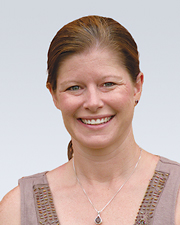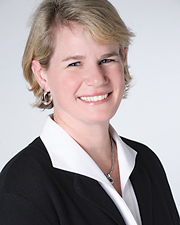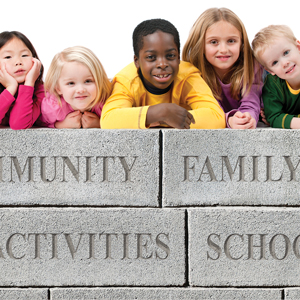Five-year-old Jerhmontey struggled with anger management and had difficulty with authority figures. In kindergarten, he was suspended for his behavior. After spending time at an afterschool and summer program for at-risk children on Richmond’s Northside, everything changed for him. Here he spent hours working with role-model teachers and mentors and by the end of first grade, was not only on the school honor roll, but was earning citizenship awards. The focus and determination he developed allowed him to accomplish his goals in everything from homework to sports.
Doug and Colleen Lubking tell the story of a six-year-old boy, struggling with school, who signed up for a gymnastics class over a decade ago. He got more than he bargained for, as his gymnastics training taught him perseverance and discipline that he then applied to school and later to diving. Ultimately, he earned a physics scholarship to college and competed on his college diving team.
As Jim Astrove, a middle school teacher and technology guru, reflects on years of monitoring students’ classroom technology use, he shares the story of a teen he caught cyber-bullying. Astrove printed out the offending text and then asked the student to read it aloud. The girl cried as she read. Astrove pointed out, “If you can’t even read it without crying, how do you think the person you sent it to feels?” Rather than merely punishing the culprit, Astrove turned the incident into a lesson in empathy.
Recently, I came across a suggestion for making a leadership chore chart. It’s the leadership part that makes this chore chart genius. The key is that kids only get credit for taking initiative and completing tasks without being asked. Two weeks after implementing the leadership chore chart, my kids’ shoes miraculously appear in the closet and the kitchen table is cleared off after meals. Even better though, I don’t spend all day nagging about the same little things. We’ve expanded the chart to include making healthy food choices and minimizing whining, and already there’s been improvement. My kids are learning responsibility and self-control through a simple tip I picked up online.
There are countless stories like these in which children’s lives are turned around by people and organizations that encourage strong character hand-in-hand with their primary purpose. It’s merely a matter of knowing where to look, because as cliché as it might sound today: It takes a village.

While teaching at-risk students, in one of the area’s public schools, Heather Goodlett felt frustration over the limitations of her job. Instead, she imagined a world in which she could teach character, along with academics, through biblical lessons. One of her driving philosophies is from Teddy Roosevelt, “To educate a man in mind and not in morals is to educate a menace to society.” Ultimately, Goodlett left teaching to found Richmond’s Youth Life Foundation (YLF) where over fifty at-risk youth attend an afterschool program staffed by certified teachers, who provide tutoring and character development instruction. In addition, children are paired with volunteer mentors who serve as role models and encourage non-academic interests. YLF also offers instruction in computer skills, financial literacy, leadership, and health and wellness. They provide a long-term commitment to nurture children and offer support to the whole family.
For Goodlett and Katharine Hunt (director of YLF’s secondary school program), compassion, respect, and responsibility are key virtues they instill in program participants. Hunt explains that their older students participate in community service projects, serve as mentors to the younger children, and act as leaders-in-training for the summer program.

YLF develops four goals for each student every school year – three academic and one character. The program focuses on character development through religious instruction and includes volunteer mentors who serve as role models. They’ve seen successes too. Over half of their participants have earned good citizen awards, attendance awards, and achieved honor roll at school.
Her work with youth leads Goodlett to caution parents that “time after school is when kids get into trouble.” If as parents we can arrange our schedules to be home after school, that’s ideal, but for most of us this isn’t a possibility. In which case, arranging for children to be involved in an organized activity with adult supervision is advised.
The key to raising children with character is involvement in our children’s lives, whether that’s after school, at family dinner times, or in other ways we can make it work. Another possibility is participating in community service projects as a family. This can provide an opportunity to build compassion and make connections. Goodlett says, “The family that can do service together is powerful.”
The Lubkings, who have coached thousands of local kids in gymnastics, agree. Colleen Lubking suggests that parents, “be actively involved by watching them (kids) succeed. But, be involved as parents, not friends.” In their dual roles as parents and coaches they know the importance of teaching children discipline. She explains that gymnastics teaches discipline through process. “You can’t circumvent the process; gravity is a hard task master.” Doug Lubking adds that his students at Gym Quest learn persistence, because gymnastics “takes years and years of screwing up” to gain mastery. The couple has watched gymnastics build character in kids – along with muscle and coordination.

Middle school teacher Jim Astrove also enjoys watching his students grow in character. After thirty years of teaching, he only posts two rules on his classroom wall: 1. Just be nice, and 2. Be good or be gone. He reminds his students, “If someone drops something, you are supposed to help them pick it up, not laugh at it.” The simplicity of these ideas is what makes them so effective. Astrove says schools should not be overlooked as a resource. Whether or not the school has a formal character development program, building character can and should be part of every classroom interaction. Astrove will tell you that this can be done without taking away from instructional time, through role modeling and building connections. He believes that “more teachers should share who they are and their story, including their mistakes. This is a great untapped resource.” Teachers who are gentle and kind “make connections” and build trust. Once those are established, then they can serve as effective role models. As our children return to the classroom this fall, Astrove recommends that parents ask what teachers and schools are doing to encourage character development so we can support those efforts at home.
Liz Pearce comes at building character in kids from a different perspective. As the director of parent engagement for Commonwealth Parenting at the Children’s Museum of Richmond, she also helps build stronger character in our children, only she does it through supporting parents’ efforts through classes, counseling, and a helpline for adults. As a parent of three herself, she knows the struggles of parenthood and strives to make parenting more collaborative.

In considering how parents might nurture their children’s character development, Pearce advises parents to ask, “Where do you want your child to be in ten years? Twenty? What traits would you like them to have? Where are they now?” She suggests that parents use this information to direct their research and to formulate a plan to raise the likelihood of success.
Narrowing down the most important character traits from the potential hundreds can be daunting. Pearce has a few favorites, “responsibility for oneself; compassion for others; and resilience…It’s hard to let your children fall down,” says Pearce, “but we need to let them do it now when they are in our homes where it is safe.” Children who are encouraged to “fix their own mistakes are less likely to make them again.” Furthermore, says Pearce, the act of fixing mistakes can encourage problem-solving skills in kids which are essential to developing resilience.
Another way we can encourage responsibility is to assign chores. Accomplishing chores teaches kids that they are resourceful and capable. “Kids will need to adapt to a quickly changing world. Resourcefulness and resilience will be essential,” Pearce predicts.

Like doing chores, Pearce believes, volunteering can teach children about responsibility and encourage resourcefulness, problem-solving skills, and self esteem which are the building blocks of resiliency. Volunteering, though, can also teach children compassion. Through volunteering, kids have a chance to see the world from different perspectives and even grow to see themselves differently.
School, sports, at-risk youth programs, and parenting organizations are only a taste of the available possibilities. Pearce even recommends investigating historical sites in the Richmond area to evaluate how we got to where we are and the morality of historical figures. Other resources to explore include religious programs, outdoor education programs, theater programs, and martial arts.
In the end though, “Parents are the number one resource in Richmond,” says Pearce. Parents are the ones who orchestrate children’s moral development. Richmond has a strong community of resources to tap, so it’s merely a matter of setting goals, finding the best resources for those goals, and formulating a plan to access those resources.
As parents and adults who embrace the responsibility to help build character in not only our own children but in all kids, we need to remember that our own characters will serve as models for all children, because as Pearce reminds us, “We share our values with our children.”




